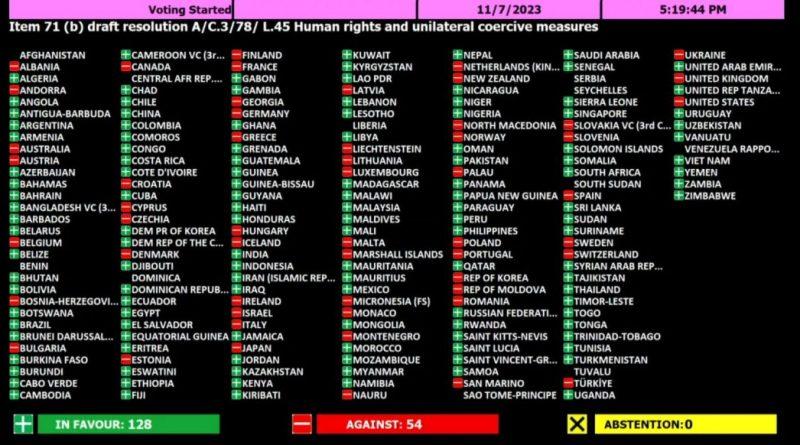The United Nations General Assembly, in its 78th period of sessions, approved with 128 votes in favor and 54 against a resolution on the promotion and protection of human rights against unilateral coercive measures, which was presented by China, Cuba and the Russian Federation.
The document calls on all States to cease adopting or implementing unilateral measures that are not compatible with international law, international humanitarian law, the Charter of the United Nations and the norms and principles governing peaceful relations between States.
Special emphasis is placed on coercive measures, “as well as all the consequent extraterritorial effects, which create obstacles to commercial relations between States, thus preventing the full realization of the rights set forth in the Universal Declaration of Human Rights.”
Likewise, it urges nations to refrain from enacting and applying unilateral measures of an economic, financial or commercial nature that are not compatible with international law and the UN Charter “that prevent the full realization of sustainable economic and social development, particularly in developing countries».
That is why the resolution condemns the inclusion of Member States on unilateral lists and false accusations «of sponsorship of terrorism and considers that these lists are instruments of political or economic pressure.»
The text indicates that such unilateral coercive measures affect vulnerable social segments, mainly children and women, by undermining their well-being and their right to food, medical care, education and necessary social services.
Furthermore, they undermine the sovereignty of peoples, which is why it urges “all Member States to neither acknowledge nor apply them, and to adopt administrative or legislative measures, as appropriate, to counteract the application or extraterritorial effects of unilateral coercive measures.”
In this sense, an invitation is extended to the Human Rights Council and the Office of the United Nations High Commissioner for Human Rights “to continue to pay attention and study how to address the negative repercussions of the application of the measures unilateral coercive measures in the enjoyment of human rights.
